高中英语 外研版(2019)必修一 Unit 5 Into the wild Using language 课件 (共49张PPT)
文档属性
| 名称 | 高中英语 外研版(2019)必修一 Unit 5 Into the wild Using language 课件 (共49张PPT) | 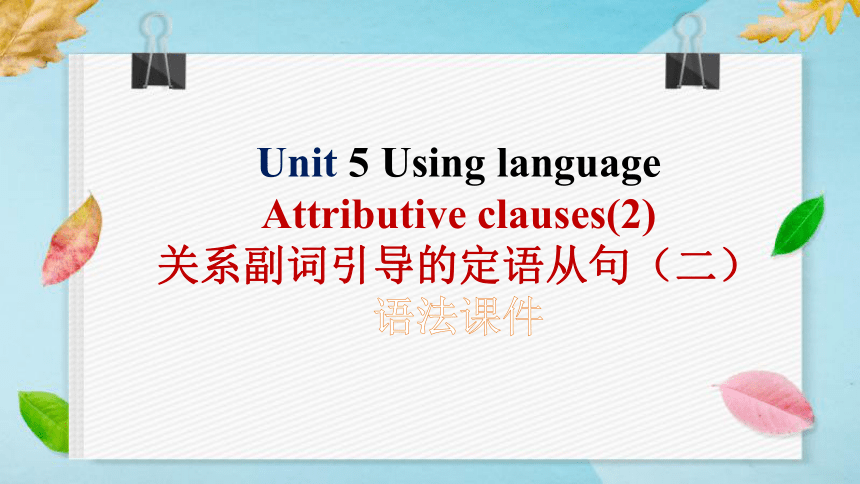 | |
| 格式 | pptx | ||
| 文件大小 | 46.4MB | ||
| 资源类型 | 教案 | ||
| 版本资源 | 外研版(2019) | ||
| 科目 | 英语 | ||
| 更新时间 | 2024-10-10 16:53:52 | ||
图片预览

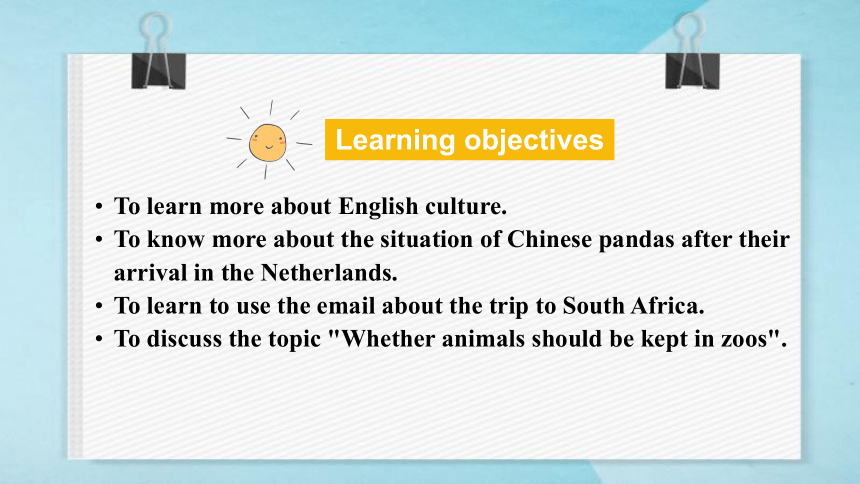
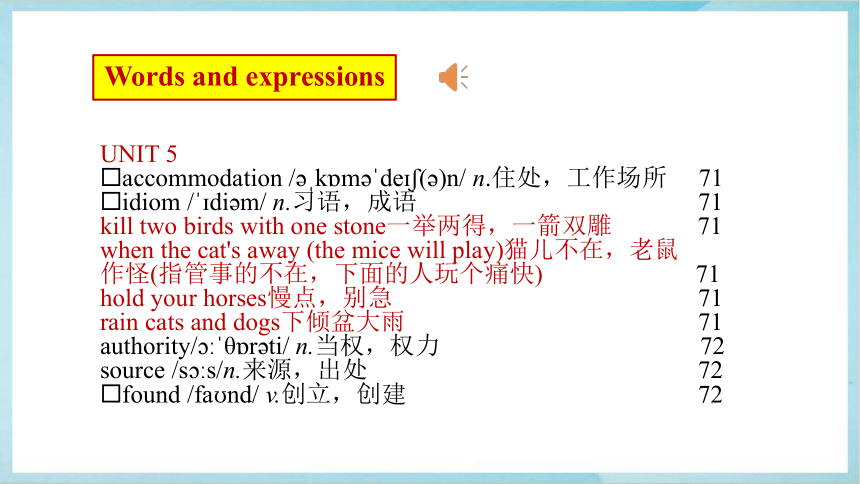
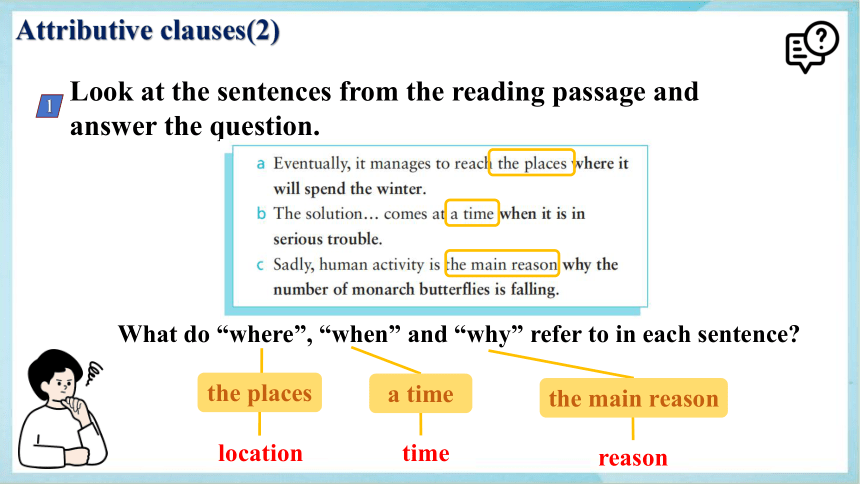
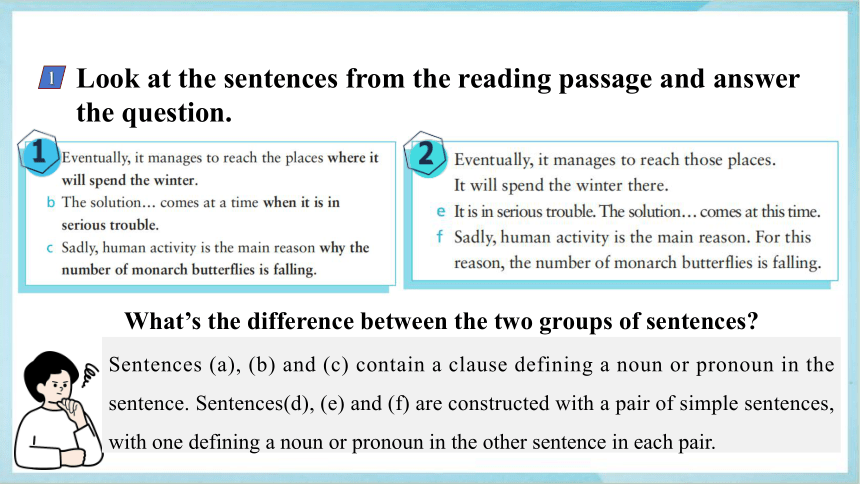
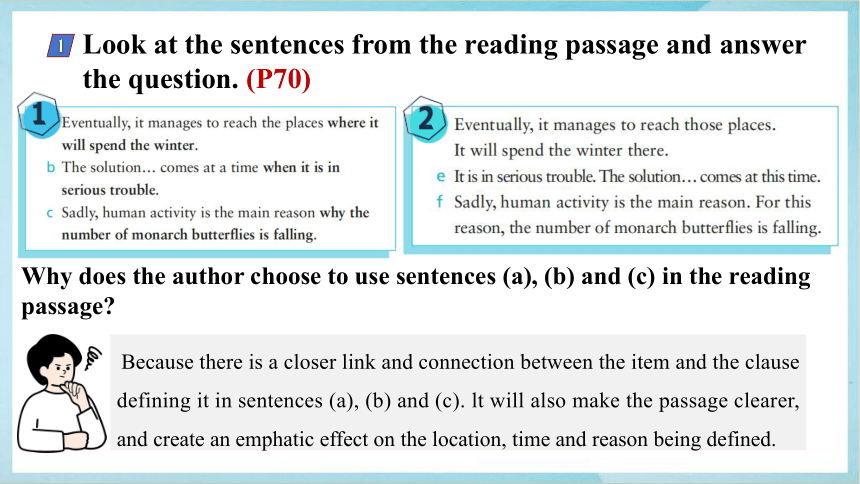
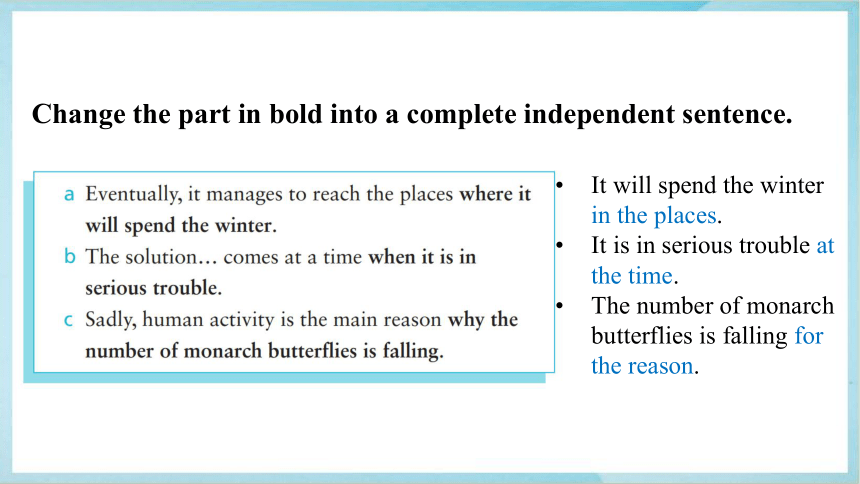

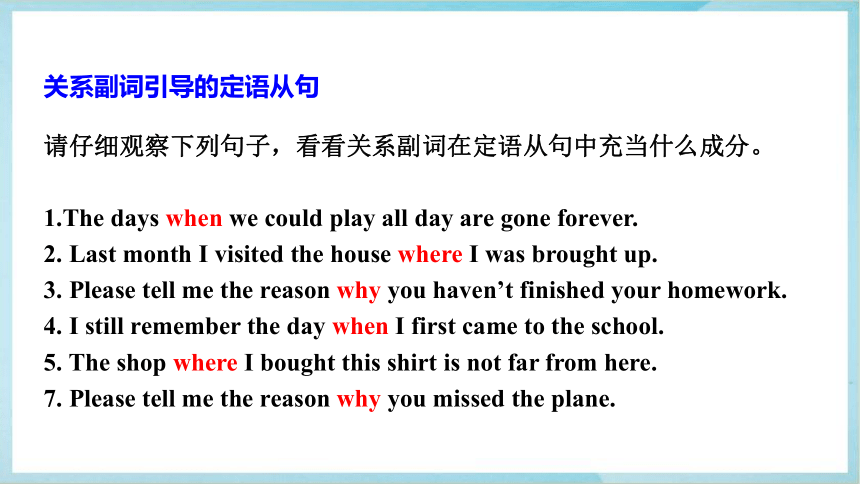
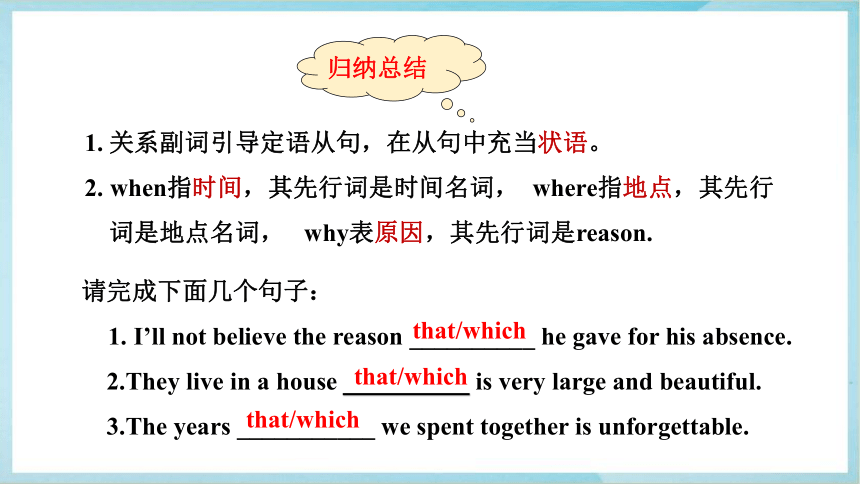
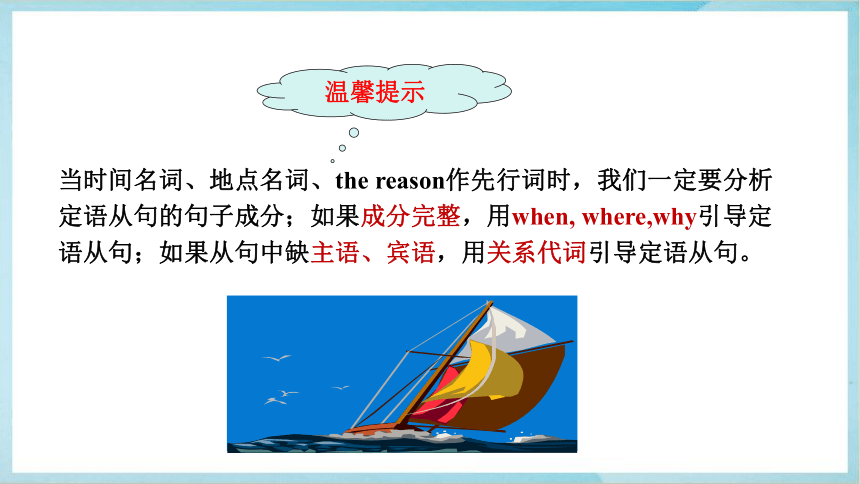
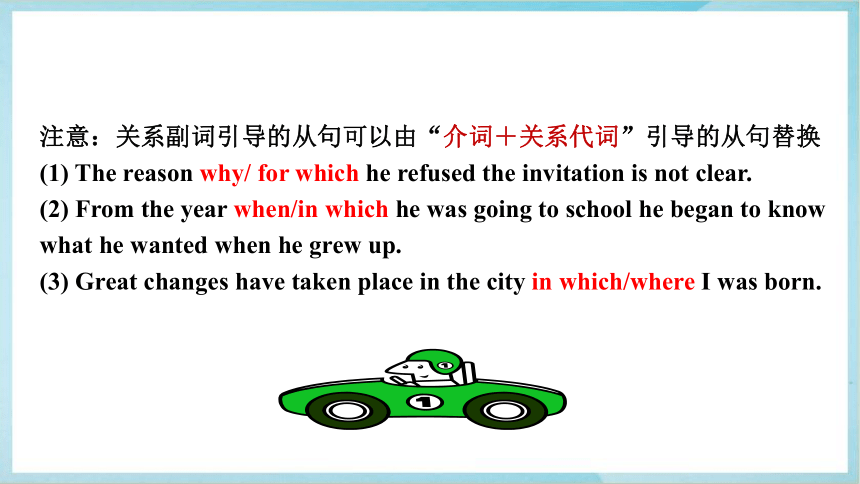
文档简介
(共49张PPT)
Unit 5 Using language
Attributive clauses(2)
关系副词引导的定语从句(二)语法课件
To learn more about English culture.
To know more about the situation of Chinese pandas after their arrival in the Netherlands.
To learn to use the email about the trip to South Africa.
To discuss the topic "Whether animals should be kept in zoos".
Learning objectives
UNIT 5
accommodation / k m de ( )n/ n.住处,工作场所 71
idiom / di m/ n.习语,成语 71
kill two birds with one stone一举两得,一箭双雕 71
when the cat's away (the mice will play)猫儿不在,老鼠
作怪(指管事的不在,下面的人玩个痛快) 71
hold your horses慢点,别急 71
rain cats and dogs下倾盆大雨 71
authority/ θ r ti/ n.当权,权力 72
source /s s/n.来源,出处 72
found /fa nd/ v.创立,创建 72
Words and expressions
Look at the sentences from the reading passage and answer the question.
What do “where”, “when” and “why” refer to in each sentence
the places
a time
the main reason
location
time
reason
1
Attributive clauses(2)
What’s the difference between the two groups of sentences
Sentences (a), (b) and (c) contain a clause defining a noun or pronoun in the sentence. Sentences(d), (e) and (f) are constructed with a pair of simple sentences, with one defining a noun or pronoun in the other sentence in each pair.
1
Look at the sentences from the reading passage and answer the question.
Why does the author choose to use sentences (a), (b) and (c) in the reading passage
Because there is a closer link and connection between the item and the clause defining it in sentences (a), (b) and (c). lt will also make the passage clearer, and create an emphatic effect on the location, time and reason being defined.
Look at the sentences from the reading passage and answer the question. (P70)
1
Change the part in bold into a complete independent sentence.
It will spend the winter in the places.
It is in serious trouble at the time.
The number of monarch butterflies is falling for the reason.
定语从句 ( 2 )
关系副词引导的定语从句
及非限制性定语从句
关系副词引导的定语从句
请仔细观察下列句子,看看关系副词在定语从句中充当什么成分。
1.The days when we could play all day are gone forever.
2. Last month I visited the house where I was brought up.
3. Please tell me the reason why you haven’t finished your homework.
4. I still remember the day when I first came to the school.
5. The shop where I bought this shirt is not far from here.
7. Please tell me the reason why you missed the plane.
归纳总结
关系副词引导定语从句,在从句中充当状语。
2. when指时间,其先行词是时间名词, where指地点,其先行词是地点名词, why表原因,其先行词是reason.
请完成下面几个句子:
1. I’ll not believe the reason __________ he gave for his absence.
2.They live in a house __________ is very large and beautiful.
3.The years ___________ we spent together is unforgettable.
that/which
that/which
that/which
温馨提示
当时间名词、地点名词、the reason作先行词时,我们一定要分析定语从句的句子成分;如果成分完整,用when, where,why引导定语从句;如果从句中缺主语、宾语,用关系代词引导定语从句。
注意:关系副词引导的从句可以由“介词+关系代词”引导的从句替换
(1) The reason why/ for which he refused the invitation is not clear.
(2) From the year when/in which he was going to school he began to know what he wanted when he grew up.
(3) Great changes have taken place in the city in which/where I was born.
区别
限制性定语从句 非限制性定语从句
与整个句子的关系 密切; 若去掉会影响句子意义的完整性 松散;
只是补充说明,
去掉后不影响句子意义的表达
逗号的运用 不用逗号 一般用逗号
that和why 可用that或why 一般用that或why
which和who在从句中作宾语时 可省略 时间、地点、原因、方式
whom在从句中作宾语时 可省略 不可省略
可否修饰整个句子 不可 可修饰整个句子,用逗号隔开,由which或as引导
翻译时的区别 常译作定语 常译为并列句或按状语从句翻译
as与which引导的非限制性定语从句的区别
(1) as引导的从句表示说话人的看法、态度解释或评论。
引导定语从句时,as仍具有“正如,像,由 可知”等意思,翻译时有时可不必译出。as引导的定语从句常含有这些动词:see, know, hear, watch, remember, say, tell, show, expect, guess等。这类动词与as连用几乎成了一种固定搭配。as引导的此类从句可以置于句首、句中或句尾。
There is a net bar around here, as I remember.
我记得这儿附近有一家网吧。
关系代词as与which引导的非限制性定语从句,其先行词都可以是整个主句,指代整个主句的意思。但as和which具有不同的词义句法和用法。
(2) which引导的从句对主所叙述的事情进行补充说明表明事物的状态或结果。
which此时指前面主所提句与主句之间常含有并列因果关系。注意它引导的从句不像as那样位置灵活它只能位于主句的后面。
He found a solution to this mystery, which (= and it) made us all excited.
他找到了此谜的一个解决方案,这让我们大家都很兴奋。
(3) 在从句中作定语或介词的宾语时要用which。
Jenny might come, in which case I'll ask her.
珍妮可能会来,要是那样的话我就去问她。
(4) 当从句的谓语动词是否定形式或含着一个复合宾语时一般用which而不用as。
He pretended not to know me, which I didn't understand.
他假装不认识我,这是我搞不明白的。
as与which引导的非限制性定语从句的区别
1. –What do you think of teaching, Bob
–I find it fun and challenging. It is a job ______ you are doing something serious but interesting.
2. Those successful deaf dancers think that dancing is an activity _____ sight matters more than hearing.
3. I’ll give you my friend’s home address, ______I can be reached most evenings.
4. All the neighbor admire this family,_________the parents are treating their child like a friend.
5. Life is like a long race _____ we compete with others to go beyond ourselves.
where
where
where
where
where
选择恰当的关系副词完成下列句子
Practice
where的先行词可以是表示不确定地点的名词,如:family, job, activity, race, play, address等等。
温馨提示
1. It’s helpful to put children in a situation______ they can see themselves differently.
2. I have reached a point in my life______ I am supposed to make decisions of my own.
3. Today we’ll discuss a number of cases ______ beginners of English fail to use the language properly.
4. I have reached a point in life _______I’m supposed to make decisions of my own.
5. He is talking about the point _______ I can’t understand.
that/which
where
where
where
选择恰当的关系副词完成下列句子
where
Practice
归纳总结
当先行词为situation, case, point时,如果定语从句中成分完整,关系副词用where,如果不完整,用关系代词引导定语从句。
当先行词为 the way 时,用什么词引导定语从句呢?
As Confucius put it, treat others in the way ( that / in which ) you want to be treated.
归纳总结
当先行词为the way时,可以用that / in which/不填 引导定语从句,也可以不用任何引导词。
完成下列句子
1. I don’t know the reason ____________________ he was absent yesterday.
2. I don’t believe the reason _____ he gave for his absence.
3. Please find me the way _______________ I can learn English grammar well easily.
4. He gave me a way _____ really works.
5. I will never forget the time ________________ we fought against our enemies together.
why/ that/
for which / 不填
that
in which
/ that / 不填
that
when/ that/ 不填
Practice
归纳总结
reason为先行词且定语从句中成分完整时,可以用that/ why/ for which来引导定语从句,也可以不用引导词。
way作先行词且定语从句中成分完整时,可以用that/ in which来引导定语从句,也可以不用引导词。
time作先行词且定语从句中成分完整时,可以用that/ when来引导定语从句,也可以不用引导词。
非限制性定语从句
What’s the difference between the two sentences
The old couple has 3 daughters who are English teachers.
The old couple has 3 daughters, who are English teachers.
温馨提示
非限制性定语从句不能对先行词加以修饰和限制,只能对先行词进行补充或说明,相当于一个and引导的并列句。
1.His parents work in Chengdu. It is the capital city of Sichuan province.
His parents work in Chengdu, which is the capital city of Sichuan province.
2.My sister is very good at English. She works hard at her lessons.
My sister, who works very hard at her lessons, is very good at English.
3.I am going to visit Renshou. There is a famous key middle-school in Renshou.
I am going to visit Renshou, where there is a famous key middle-school.
4.There are 56 students in our class. 24 of us are girls.
There are 56 students in our class, 24 of whom are girls.
将下列的每组句子合并成一个含有非限制性定语从句的复合句
Practice
As is reported in the newspaper, he saved a seriously injured old man the other day.
As we all know, China is a developing country.
China, as we all know, is a developing country.
China is a developing country, as we all know.
He passed the College Entrance Examination, which surprised all of us.
Our head teacher didn’t come this morning, which made us very happy.
仔细观察下列非限制性定语从句,看看as和which 的先行词是什么
as和which引导非限制性定语从句,有相同之处也有不同之处。具体情况是:
1.as和which都可以在定语从句中做主语或者宾语,代表前面整个句子。
as引导非限制性定语从句,可放在主句之前,或者主句之后,甚至可以放在句中;which引导的非限制性定语从句只能放在主句之后。另外,as有“正如……,正像……”的意思, 而which翻译为“这件事”“这一点”。
2. 注意:当主句和从句存在逻辑上的因果关系时,常用which
Tom was always late for school, which made his teacher angry.
归纳总结
用be的适当形式填空:
They are the workers who ______ going to work abroad.
He is one of the students who _______ good at English.
He is the one of the students who ______ good at English.
定语从句中的主谓一致
are
are
is
关系代词在定语从句中作主语时,从句的谓语必须与先行词保持人称和数的一致。但当one of修饰先行词时,如果one前有the/ the only/the exact/ the very等修饰时,从句谓语用单数。
归纳总结
Practice
定语从句关系词选择的解题步骤
分析定语从句的句子成分,看看缺少什么成分。
确定用关系代词还是用关系副词引导定语从句。
如果是介词+关系代词,要考虑介词和先行词的搭配、和从句中谓语动词的搭配、是否是固定短语。
温馨提示
Read the passage and underline the words what where, when and why refer to. (P70)
In April 2017, two giant pandas from China arrived at a zoo in the Netherlands(荷兰). There, they were welcomed to the Chinese-style compound (中式大院)where they were to live. On 30 May, after the preparations were
complete, the day finally came when the pandas met their fans for the first time. People
were excited – the zoo is the only place in the country where it is possible to
see pandas. In fact, the last time there were pandas in the Netherlands was in 1987. And of course, the main reason why they were so excited is that pandas are just so cute!
= in the Chinese-style compound
= on the day
= in the place
= for the reason
2
2017年4月,两只来自中国的大熊猫抵达荷兰的一家动物园。在那里,他们被欢迎到他们将要居住的中式大院。5月30日,准备工作完成后,熊猫们终于迎来了第一次与粉丝见面的日子。人们都很兴奋——动物园是这个国家唯一能看到熊猫的地方。事实上,上一次在荷兰有熊猫是在1987年。当然,他们如此兴奋的主要原因是熊猫太可爱了。
3
Complete the email with where, when or why. (P71)
Hi Kay,
We’re having an amazing time here in South Africa. Our accommodation is perfect. It is in a location______ we canwatch animals wandering past on their way to the waterhole. Sunset is the time of day______we sit on the balcony and count how many giraffes or antelopes we can see. I guess this is the reason _____ this place is so popular. Next week, we are going to fy up to Zambia. That’s one of the countries ______ you can visit the famous Victoria Fall.
See you soon.
David
where
when
why
where
3
Complete the email with where, when or why. (P71)
Animal idioms
________________________
1 as busy as a(n) .
2 kill two with one stone
3 When the cat’s away, the will play.
4 hold your .
5 It’s raining and .
bee
birds
mice
horses
cats
dogs
像蜜蜂一样繁忙
一石二鸟;一举两得
猫儿不在,老鼠作怪(指管事的不在,下面的人玩个痛快)
慢点,别急
在下倾盆大雨
4
Look at the pictures and complete the idioms with animal names. (P71)
English idioms are a way of adding colour to the language. For example, instead of saying “It’s raining heavily”, you could say1 . Another reason to use idioms is that they are concise. For example, to describe someone who is always working or busy doing something, we can say they are2 . If they’re rushing into something and should wait and be patient, you could say “3 ”. Learning idioms can be fun, especially when we compare them to Chinese equivalents. Take, for example, “4 ” (people do what they want and have fun when someone in authority is absent) and “5 ” (solve two problems with one action) -- are there corresponding idioms in Chinese.
It’s raining cats and dogs
as busy as a bee
hold your horses
When the cat’s away, the mice will play
kill two birds with one stone
concise adj. 简洁的
rush into 冲进
equivalent n.等同物
authority n. 当权,权力
correspond v. 与...相对应
5
Complete the paragraph with the animal idioms in Activity 4. (P72)
put the cart before the horse
lock the stable door after the horse has been stolen
birds of a feather flock together
look a gift horse in the month
ride the high horse
let sleeping dogs lie
black horse
本末倒置
亡羊补牢
物以类聚
吹毛求疵
趾高气扬
莫惹是非
害群之马
5
Work in pairs. Find more animal idioms. Choose an idiom and describe a situation with it. (P72)
A:She’s as busy as a bee.
B: What makes you say that
A: Preparing for the following final exam, she has been working from morning till night.
B: Oh, I’ve got it.
6
Work in pairs. Find more animal idioms. Choose an idiom and describe a situation with it. (P72)
Why are there so many idioms about animals
· Because people used to use horses
a lot for work and transportation,
there are a
lot of horse idioms.
Debating about animals
________________________
· Dogs were first domesticated over
14,000 years ago. Sheep, cows and
pigs have been kept at home as
sources of food for around 7,000
years.
· The oldest zoo in the world is in
Vienna, opened in 1752. The
oldest zoo in China is Beijing
Zoo, which was founded in 1906.
Do you like to
go to the zoo
What animals are there in the zoo
domesticate v. 驯化;驯养
●狗最早是在14000年前被驯化的。羊、牛和猪作为食物来源已经在家里饲养了大约7000年。
●世界上最古老的动物园在维也纳,于1752年开放。中国最古老的动物园是北京动物园,始建于1906年。
1 Can zoo animals survive in the wild
2 Can zoos offer animals their natural environment
3 Should we keep wild animals in zoos
4 Should we educate people more about animals
Learning to learn
In a debate, first listen out for the main topic. This is usually a statement or question at the very start of the debate. Speakers will state whether they are for or against the statement. Then, they will introduce their supporting arguments with expressions such as We must remember that... and We can’t deny that...
7
Listen to the TV debate and choose the correct topic. (P73)
For
Debate
Zoos can help protect animals
1 .
Zoos are a good way to 2 .
Zoos allow us to see and learn about animals in places similar to their3 .
in danger of dying out
educate people about animals
natural environments
8
Listen again and complete the mind map.(P73)
Against
Debate
Zoo animals can 4 and be unable to live on their own when returned to the wild.
Zoos cannot offer animals an environment that’s
5 their natural one.
Zoos 6 __________________people than for animals.
depend too much on humans
as good as
do more good for
8
Listen again and complete the mind map.(P73)
Now talk about how the speakers express agreement and disagreement. Listen again if necessary.
DJ: Joining us today we have zookeeper Max Wilson, and Amy Lee from the organization Keep Wild Animals Wild. They are here to discuss whether we should keep wild animals in zoos. Max, let's start with you.
Max: As a zookeeper, I've seen how zoos help protect animals in danger of dying out. For example, my zoo is well-known for its programme to save tigers.
Now talk about how the speakers express agreement and disagreement. Listen again if necessary.
Amy: I'm afraid I don't agree that these programmes are always successful. We've seen a lot of examples where the animals start to depend too much on humans, and are unable to live on their own when returned to the wild. We've seen a lot of examples that have failed.
Max: But you must admit there are successful ones. And zoos are also a good way to educate people about animals. That's killing two birds with one stone.
Amy: Oh, I totally agree that people should learn as much as possible about animals because we share the planet with them.
Max: Exactly, Zoos allow us to observe animals in places that are similar to their natural environments.
Amy: I'm sorry, but that's just not true. No zoo can offer its animals an environment that's as good as their natural one. Elephants, for example, need a huge amount of space to live happily. On the whole, I think zoos do more good for people than for animals.
DJ: Well, I think we all agree that we should do our best to help protect animals and teach people more about them, Let's continue this discussion after a short break.
Student A
You are in favour of keeping animals as pets. You have the following arguments:
Keeping pets develops a kind and caring attitude towards animals.
Keeping pets is good for people’s physical and mental health.
Keeping pets helps people know more about animals.
Useful expressions
Agreeing
Exactly!
I agree.
That is true.
I see your point.
No doubt about it.
I suppose so.
Disagreeing
I don’t agree.
That’s just not true.
I’m afraid I totally disagree.
I’m not so sure about that.
I don’t think so.
That’s not always the same.
9
Work in pairs. Hold a debate on whether we should keep animals as pets.(P73)
Student B
You are against keeping animals as pets. You have the following arguments:
Caring for other people is more important than caring for animals.
It is bad for animals’ physical and mental health to be kept as pets.
Animals kept at home can cause trouble for neighbours.
Useful expressions
Agreeing
Exactly!
I agree.
That is true.
I see your point.
No doubt about it.
I suppose so.
Disagreeing
I don’t agree.
That’s just not true.
I’m afraid I totally disagree.
I’m not so sure about that.
I don’t think so.
That’s not always the same.
9
Work in pairs. Hold a debate on whether we should keep animals as pets.(P73)
Useful expressions:
Agreeing
1. Exactly!
2. I agree.
3. That is true.
4. I see your point.
5. No doubt about it.
6. I suppose so.
Disagreeing
1. I don't agree.
2. That's just not true.
3. I'm afraid I totally disagree.
4. I'm not so sure about that.
5. I don't think so.
6. That's not always the same.
9
Work in pairs. Think of another topic that is related to animals and hold a debate.(P73)
1. Review the points from the lesson and complete the exercises.
2. Think about another topic that is related to animals, then hold a debate with your partner.
Homework
Unit 5 Using language
Attributive clauses(2)
关系副词引导的定语从句(二)语法课件
To learn more about English culture.
To know more about the situation of Chinese pandas after their arrival in the Netherlands.
To learn to use the email about the trip to South Africa.
To discuss the topic "Whether animals should be kept in zoos".
Learning objectives
UNIT 5
accommodation / k m de ( )n/ n.住处,工作场所 71
idiom / di m/ n.习语,成语 71
kill two birds with one stone一举两得,一箭双雕 71
when the cat's away (the mice will play)猫儿不在,老鼠
作怪(指管事的不在,下面的人玩个痛快) 71
hold your horses慢点,别急 71
rain cats and dogs下倾盆大雨 71
authority/ θ r ti/ n.当权,权力 72
source /s s/n.来源,出处 72
found /fa nd/ v.创立,创建 72
Words and expressions
Look at the sentences from the reading passage and answer the question.
What do “where”, “when” and “why” refer to in each sentence
the places
a time
the main reason
location
time
reason
1
Attributive clauses(2)
What’s the difference between the two groups of sentences
Sentences (a), (b) and (c) contain a clause defining a noun or pronoun in the sentence. Sentences(d), (e) and (f) are constructed with a pair of simple sentences, with one defining a noun or pronoun in the other sentence in each pair.
1
Look at the sentences from the reading passage and answer the question.
Why does the author choose to use sentences (a), (b) and (c) in the reading passage
Because there is a closer link and connection between the item and the clause defining it in sentences (a), (b) and (c). lt will also make the passage clearer, and create an emphatic effect on the location, time and reason being defined.
Look at the sentences from the reading passage and answer the question. (P70)
1
Change the part in bold into a complete independent sentence.
It will spend the winter in the places.
It is in serious trouble at the time.
The number of monarch butterflies is falling for the reason.
定语从句 ( 2 )
关系副词引导的定语从句
及非限制性定语从句
关系副词引导的定语从句
请仔细观察下列句子,看看关系副词在定语从句中充当什么成分。
1.The days when we could play all day are gone forever.
2. Last month I visited the house where I was brought up.
3. Please tell me the reason why you haven’t finished your homework.
4. I still remember the day when I first came to the school.
5. The shop where I bought this shirt is not far from here.
7. Please tell me the reason why you missed the plane.
归纳总结
关系副词引导定语从句,在从句中充当状语。
2. when指时间,其先行词是时间名词, where指地点,其先行词是地点名词, why表原因,其先行词是reason.
请完成下面几个句子:
1. I’ll not believe the reason __________ he gave for his absence.
2.They live in a house __________ is very large and beautiful.
3.The years ___________ we spent together is unforgettable.
that/which
that/which
that/which
温馨提示
当时间名词、地点名词、the reason作先行词时,我们一定要分析定语从句的句子成分;如果成分完整,用when, where,why引导定语从句;如果从句中缺主语、宾语,用关系代词引导定语从句。
注意:关系副词引导的从句可以由“介词+关系代词”引导的从句替换
(1) The reason why/ for which he refused the invitation is not clear.
(2) From the year when/in which he was going to school he began to know what he wanted when he grew up.
(3) Great changes have taken place in the city in which/where I was born.
区别
限制性定语从句 非限制性定语从句
与整个句子的关系 密切; 若去掉会影响句子意义的完整性 松散;
只是补充说明,
去掉后不影响句子意义的表达
逗号的运用 不用逗号 一般用逗号
that和why 可用that或why 一般用that或why
which和who在从句中作宾语时 可省略 时间、地点、原因、方式
whom在从句中作宾语时 可省略 不可省略
可否修饰整个句子 不可 可修饰整个句子,用逗号隔开,由which或as引导
翻译时的区别 常译作定语 常译为并列句或按状语从句翻译
as与which引导的非限制性定语从句的区别
(1) as引导的从句表示说话人的看法、态度解释或评论。
引导定语从句时,as仍具有“正如,像,由 可知”等意思,翻译时有时可不必译出。as引导的定语从句常含有这些动词:see, know, hear, watch, remember, say, tell, show, expect, guess等。这类动词与as连用几乎成了一种固定搭配。as引导的此类从句可以置于句首、句中或句尾。
There is a net bar around here, as I remember.
我记得这儿附近有一家网吧。
关系代词as与which引导的非限制性定语从句,其先行词都可以是整个主句,指代整个主句的意思。但as和which具有不同的词义句法和用法。
(2) which引导的从句对主所叙述的事情进行补充说明表明事物的状态或结果。
which此时指前面主所提句与主句之间常含有并列因果关系。注意它引导的从句不像as那样位置灵活它只能位于主句的后面。
He found a solution to this mystery, which (= and it) made us all excited.
他找到了此谜的一个解决方案,这让我们大家都很兴奋。
(3) 在从句中作定语或介词的宾语时要用which。
Jenny might come, in which case I'll ask her.
珍妮可能会来,要是那样的话我就去问她。
(4) 当从句的谓语动词是否定形式或含着一个复合宾语时一般用which而不用as。
He pretended not to know me, which I didn't understand.
他假装不认识我,这是我搞不明白的。
as与which引导的非限制性定语从句的区别
1. –What do you think of teaching, Bob
–I find it fun and challenging. It is a job ______ you are doing something serious but interesting.
2. Those successful deaf dancers think that dancing is an activity _____ sight matters more than hearing.
3. I’ll give you my friend’s home address, ______I can be reached most evenings.
4. All the neighbor admire this family,_________the parents are treating their child like a friend.
5. Life is like a long race _____ we compete with others to go beyond ourselves.
where
where
where
where
where
选择恰当的关系副词完成下列句子
Practice
where的先行词可以是表示不确定地点的名词,如:family, job, activity, race, play, address等等。
温馨提示
1. It’s helpful to put children in a situation______ they can see themselves differently.
2. I have reached a point in my life______ I am supposed to make decisions of my own.
3. Today we’ll discuss a number of cases ______ beginners of English fail to use the language properly.
4. I have reached a point in life _______I’m supposed to make decisions of my own.
5. He is talking about the point _______ I can’t understand.
that/which
where
where
where
选择恰当的关系副词完成下列句子
where
Practice
归纳总结
当先行词为situation, case, point时,如果定语从句中成分完整,关系副词用where,如果不完整,用关系代词引导定语从句。
当先行词为 the way 时,用什么词引导定语从句呢?
As Confucius put it, treat others in the way ( that / in which ) you want to be treated.
归纳总结
当先行词为the way时,可以用that / in which/不填 引导定语从句,也可以不用任何引导词。
完成下列句子
1. I don’t know the reason ____________________ he was absent yesterday.
2. I don’t believe the reason _____ he gave for his absence.
3. Please find me the way _______________ I can learn English grammar well easily.
4. He gave me a way _____ really works.
5. I will never forget the time ________________ we fought against our enemies together.
why/ that/
for which / 不填
that
in which
/ that / 不填
that
when/ that/ 不填
Practice
归纳总结
reason为先行词且定语从句中成分完整时,可以用that/ why/ for which来引导定语从句,也可以不用引导词。
way作先行词且定语从句中成分完整时,可以用that/ in which来引导定语从句,也可以不用引导词。
time作先行词且定语从句中成分完整时,可以用that/ when来引导定语从句,也可以不用引导词。
非限制性定语从句
What’s the difference between the two sentences
The old couple has 3 daughters who are English teachers.
The old couple has 3 daughters, who are English teachers.
温馨提示
非限制性定语从句不能对先行词加以修饰和限制,只能对先行词进行补充或说明,相当于一个and引导的并列句。
1.His parents work in Chengdu. It is the capital city of Sichuan province.
His parents work in Chengdu, which is the capital city of Sichuan province.
2.My sister is very good at English. She works hard at her lessons.
My sister, who works very hard at her lessons, is very good at English.
3.I am going to visit Renshou. There is a famous key middle-school in Renshou.
I am going to visit Renshou, where there is a famous key middle-school.
4.There are 56 students in our class. 24 of us are girls.
There are 56 students in our class, 24 of whom are girls.
将下列的每组句子合并成一个含有非限制性定语从句的复合句
Practice
As is reported in the newspaper, he saved a seriously injured old man the other day.
As we all know, China is a developing country.
China, as we all know, is a developing country.
China is a developing country, as we all know.
He passed the College Entrance Examination, which surprised all of us.
Our head teacher didn’t come this morning, which made us very happy.
仔细观察下列非限制性定语从句,看看as和which 的先行词是什么
as和which引导非限制性定语从句,有相同之处也有不同之处。具体情况是:
1.as和which都可以在定语从句中做主语或者宾语,代表前面整个句子。
as引导非限制性定语从句,可放在主句之前,或者主句之后,甚至可以放在句中;which引导的非限制性定语从句只能放在主句之后。另外,as有“正如……,正像……”的意思, 而which翻译为“这件事”“这一点”。
2. 注意:当主句和从句存在逻辑上的因果关系时,常用which
Tom was always late for school, which made his teacher angry.
归纳总结
用be的适当形式填空:
They are the workers who ______ going to work abroad.
He is one of the students who _______ good at English.
He is the one of the students who ______ good at English.
定语从句中的主谓一致
are
are
is
关系代词在定语从句中作主语时,从句的谓语必须与先行词保持人称和数的一致。但当one of修饰先行词时,如果one前有the/ the only/the exact/ the very等修饰时,从句谓语用单数。
归纳总结
Practice
定语从句关系词选择的解题步骤
分析定语从句的句子成分,看看缺少什么成分。
确定用关系代词还是用关系副词引导定语从句。
如果是介词+关系代词,要考虑介词和先行词的搭配、和从句中谓语动词的搭配、是否是固定短语。
温馨提示
Read the passage and underline the words what where, when and why refer to. (P70)
In April 2017, two giant pandas from China arrived at a zoo in the Netherlands(荷兰). There, they were welcomed to the Chinese-style compound (中式大院)where they were to live. On 30 May, after the preparations were
complete, the day finally came when the pandas met their fans for the first time. People
were excited – the zoo is the only place in the country where it is possible to
see pandas. In fact, the last time there were pandas in the Netherlands was in 1987. And of course, the main reason why they were so excited is that pandas are just so cute!
= in the Chinese-style compound
= on the day
= in the place
= for the reason
2
2017年4月,两只来自中国的大熊猫抵达荷兰的一家动物园。在那里,他们被欢迎到他们将要居住的中式大院。5月30日,准备工作完成后,熊猫们终于迎来了第一次与粉丝见面的日子。人们都很兴奋——动物园是这个国家唯一能看到熊猫的地方。事实上,上一次在荷兰有熊猫是在1987年。当然,他们如此兴奋的主要原因是熊猫太可爱了。
3
Complete the email with where, when or why. (P71)
Hi Kay,
We’re having an amazing time here in South Africa. Our accommodation is perfect. It is in a location______ we canwatch animals wandering past on their way to the waterhole. Sunset is the time of day______we sit on the balcony and count how many giraffes or antelopes we can see. I guess this is the reason _____ this place is so popular. Next week, we are going to fy up to Zambia. That’s one of the countries ______ you can visit the famous Victoria Fall.
See you soon.
David
where
when
why
where
3
Complete the email with where, when or why. (P71)
Animal idioms
________________________
1 as busy as a(n) .
2 kill two with one stone
3 When the cat’s away, the will play.
4 hold your .
5 It’s raining and .
bee
birds
mice
horses
cats
dogs
像蜜蜂一样繁忙
一石二鸟;一举两得
猫儿不在,老鼠作怪(指管事的不在,下面的人玩个痛快)
慢点,别急
在下倾盆大雨
4
Look at the pictures and complete the idioms with animal names. (P71)
English idioms are a way of adding colour to the language. For example, instead of saying “It’s raining heavily”, you could say1 . Another reason to use idioms is that they are concise. For example, to describe someone who is always working or busy doing something, we can say they are2 . If they’re rushing into something and should wait and be patient, you could say “3 ”. Learning idioms can be fun, especially when we compare them to Chinese equivalents. Take, for example, “4 ” (people do what they want and have fun when someone in authority is absent) and “5 ” (solve two problems with one action) -- are there corresponding idioms in Chinese.
It’s raining cats and dogs
as busy as a bee
hold your horses
When the cat’s away, the mice will play
kill two birds with one stone
concise adj. 简洁的
rush into 冲进
equivalent n.等同物
authority n. 当权,权力
correspond v. 与...相对应
5
Complete the paragraph with the animal idioms in Activity 4. (P72)
put the cart before the horse
lock the stable door after the horse has been stolen
birds of a feather flock together
look a gift horse in the month
ride the high horse
let sleeping dogs lie
black horse
本末倒置
亡羊补牢
物以类聚
吹毛求疵
趾高气扬
莫惹是非
害群之马
5
Work in pairs. Find more animal idioms. Choose an idiom and describe a situation with it. (P72)
A:She’s as busy as a bee.
B: What makes you say that
A: Preparing for the following final exam, she has been working from morning till night.
B: Oh, I’ve got it.
6
Work in pairs. Find more animal idioms. Choose an idiom and describe a situation with it. (P72)
Why are there so many idioms about animals
· Because people used to use horses
a lot for work and transportation,
there are a
lot of horse idioms.
Debating about animals
________________________
· Dogs were first domesticated over
14,000 years ago. Sheep, cows and
pigs have been kept at home as
sources of food for around 7,000
years.
· The oldest zoo in the world is in
Vienna, opened in 1752. The
oldest zoo in China is Beijing
Zoo, which was founded in 1906.
Do you like to
go to the zoo
What animals are there in the zoo
domesticate v. 驯化;驯养
●狗最早是在14000年前被驯化的。羊、牛和猪作为食物来源已经在家里饲养了大约7000年。
●世界上最古老的动物园在维也纳,于1752年开放。中国最古老的动物园是北京动物园,始建于1906年。
1 Can zoo animals survive in the wild
2 Can zoos offer animals their natural environment
3 Should we keep wild animals in zoos
4 Should we educate people more about animals
Learning to learn
In a debate, first listen out for the main topic. This is usually a statement or question at the very start of the debate. Speakers will state whether they are for or against the statement. Then, they will introduce their supporting arguments with expressions such as We must remember that... and We can’t deny that...
7
Listen to the TV debate and choose the correct topic. (P73)
For
Debate
Zoos can help protect animals
1 .
Zoos are a good way to 2 .
Zoos allow us to see and learn about animals in places similar to their3 .
in danger of dying out
educate people about animals
natural environments
8
Listen again and complete the mind map.(P73)
Against
Debate
Zoo animals can 4 and be unable to live on their own when returned to the wild.
Zoos cannot offer animals an environment that’s
5 their natural one.
Zoos 6 __________________people than for animals.
depend too much on humans
as good as
do more good for
8
Listen again and complete the mind map.(P73)
Now talk about how the speakers express agreement and disagreement. Listen again if necessary.
DJ: Joining us today we have zookeeper Max Wilson, and Amy Lee from the organization Keep Wild Animals Wild. They are here to discuss whether we should keep wild animals in zoos. Max, let's start with you.
Max: As a zookeeper, I've seen how zoos help protect animals in danger of dying out. For example, my zoo is well-known for its programme to save tigers.
Now talk about how the speakers express agreement and disagreement. Listen again if necessary.
Amy: I'm afraid I don't agree that these programmes are always successful. We've seen a lot of examples where the animals start to depend too much on humans, and are unable to live on their own when returned to the wild. We've seen a lot of examples that have failed.
Max: But you must admit there are successful ones. And zoos are also a good way to educate people about animals. That's killing two birds with one stone.
Amy: Oh, I totally agree that people should learn as much as possible about animals because we share the planet with them.
Max: Exactly, Zoos allow us to observe animals in places that are similar to their natural environments.
Amy: I'm sorry, but that's just not true. No zoo can offer its animals an environment that's as good as their natural one. Elephants, for example, need a huge amount of space to live happily. On the whole, I think zoos do more good for people than for animals.
DJ: Well, I think we all agree that we should do our best to help protect animals and teach people more about them, Let's continue this discussion after a short break.
Student A
You are in favour of keeping animals as pets. You have the following arguments:
Keeping pets develops a kind and caring attitude towards animals.
Keeping pets is good for people’s physical and mental health.
Keeping pets helps people know more about animals.
Useful expressions
Agreeing
Exactly!
I agree.
That is true.
I see your point.
No doubt about it.
I suppose so.
Disagreeing
I don’t agree.
That’s just not true.
I’m afraid I totally disagree.
I’m not so sure about that.
I don’t think so.
That’s not always the same.
9
Work in pairs. Hold a debate on whether we should keep animals as pets.(P73)
Student B
You are against keeping animals as pets. You have the following arguments:
Caring for other people is more important than caring for animals.
It is bad for animals’ physical and mental health to be kept as pets.
Animals kept at home can cause trouble for neighbours.
Useful expressions
Agreeing
Exactly!
I agree.
That is true.
I see your point.
No doubt about it.
I suppose so.
Disagreeing
I don’t agree.
That’s just not true.
I’m afraid I totally disagree.
I’m not so sure about that.
I don’t think so.
That’s not always the same.
9
Work in pairs. Hold a debate on whether we should keep animals as pets.(P73)
Useful expressions:
Agreeing
1. Exactly!
2. I agree.
3. That is true.
4. I see your point.
5. No doubt about it.
6. I suppose so.
Disagreeing
1. I don't agree.
2. That's just not true.
3. I'm afraid I totally disagree.
4. I'm not so sure about that.
5. I don't think so.
6. That's not always the same.
9
Work in pairs. Think of another topic that is related to animals and hold a debate.(P73)
1. Review the points from the lesson and complete the exercises.
2. Think about another topic that is related to animals, then hold a debate with your partner.
Homework
